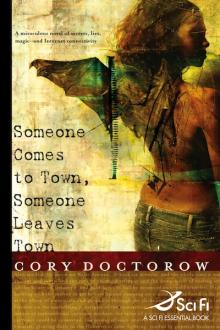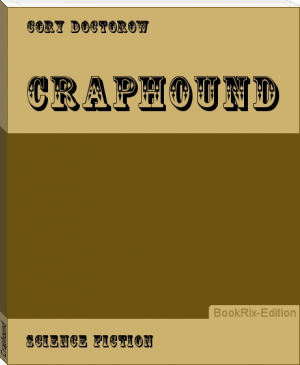Someone Comes to Town, Someone Leaves Town by Cory Doctorow (graded readers TXT) 📕

- Author: Cory Doctorow
- Performer: 0765312786
Book online «Someone Comes to Town, Someone Leaves Town by Cory Doctorow (graded readers TXT) 📕». Author Cory Doctorow
Augusta Avenue and Oxford were both out; even after midnight, when the stores were all shuttered, there was far too much foot traffic for Davey to pass by unnoticed. But the alleys that mazed the back ways were ideal. Some were fenced off, some were too narrow to pass, but most of them -- he'd tried to navigate them by bicycle once and found himself utterly lost. He'd had to turn around slowly until he spotted the CN Tower and use it to get his bearings.
He poked at the map, sipping the coffee, then ordering another from the Greek's son, who hadn't yet figured out that he was a regular and so sneered at his laptop with undisguised contempt. "Computers, huh?" he said. "Doesn't anyone just read a book anymore?"
"I used to own a bookstore," Alan said, then held up a finger and moused over to his photo album and brought up the thumbnails of his old bookstore. "See?"
The Greek's son, thirty with a paunch and sweat-rings under the pits of his white "The Greek's" T-shirt, sat down and looked at the photos. "I remember that place, on Harbord Street, right?"
Alan smiled. "Yup. We lost the store when they blew up the abortion clinic next door," he said. "Insurance paid out, but I wasn't ready to start over with another bookstore."
The Greek's son shook his head. "Another coffee, right?"
"Right," Alan said.
Alan went back to the map, realigning the laptop for optimal reception again.
"You got a wireless card in that?" a young guy at the next table asked. He was dressed in Kensington Market crusty-punk chic, tatts and facial piercings, filth-gray bunchoffuckinggoofs tee, cutoffs, and sweaty high boots draped with chains.
"Yeah," Alan said. He sighed and closed the map window. He wasn't getting anywhere, anyway.
"And you get service here? Where's your access point?" Crusty-punk or no, he sounded as nerdy as any of the Web-heads you'd find shopping for bargains on CD blanks on College Street.
"Three blocks that way," Alan said, pointing. "Hanging off my house. The network name is 'walesave.'"
"Shit, that's you?" the kid said. "Goddammit, you're clobbering our access points!"
"What access point?"
"Access points. ParasiteNet." He indicated a peeling sticker on the lapel of his cut-down leather jacket showing a skull with crossed radio towers underneath it. "I'm trying to get a mesh-net running though all of the Market, and you're hammering me. Jesus, I was ready to rat you out to the radio cops at the Canadian Radio and Television Commission. Dude, you've got to turn down the freaking gain on those things."
"What's a mesh-net?"
The kid moved his beer over to Alan's table and sat down. "Okay, so pretend that your laptop is the access point. It radiates more or less equally in all directions, depending on your antenna characteristics and leaving out the RF shadows that microwaves and stucco and cordless phones generate." He arranged the coffee cup and the beer at equal distances from the laptop, then moved them around to demonstrate the coverage area. "Right, so what happens if I'm out of range, over here --" he put his beer back on his own table -- "and you want to reach me? Well, you could just turn up the gain on your access point, either by increasing the power so that it radiates farther in all directions, or by focusing the transmissions so they travel farther in a line of sight."
"Right," Alan said, sipping his coffee.
"Right. So both of those approaches suck. If you turn up the power, you radiate over everyone else's signal, so if I've got an access point here" -- he held his fist between their tables -- "no one can hear it because you're drowning it out. It's like you're shouting so loud that no one else can carry on a conversation."
"So why don't you just use my network? I want to be able to get online anywhere in the Market, but that means that anyone can, right?"
The crusty-punk waved his hand dismissively. "Sure, whatever. But what happens if your network gets shut down? Or if you decide to start eavesdropping on other people? Or if someone wants to get to the printer in her living room? It's no good."
"So, what, you want me to switch to focused antennae?"
"That's no good. If you used a focused signal, you're going to have to be perfectly aligned if you're going to talk back to your base, so unless you want to provide a connection to one tiny pinpoint somewhere a couple kilometers away, it won't do you any good."
"There's no solution, then? I should just give up?"
The crusty-punk held up his hands. "Hell, no! There's just no centralized solution. You can't be Superman, blanketing the whole world with wireless using your almighty antennaprick, but so what? That's what mesh networks are for. Check it out." He arranged the beer and the laptop and the coffee cup so that they were strung out along a straight line. "Okay, you're the laptop and I'm the coffee cup. We both have a radio and we want to talk to each other.
"We could turn up the gain on our radios so that they can shout loud enough to be heard at this distance, but that would drown out this guy here." He gestured at the now-empty beer. "We could use a focused antenna, but if I move a little bit off the beam" -- he nudged the coffee cup to one side --Doesn't
"we're dead. But there's a third solution."
"We ask the beer to pass messages around?"
"Fucking right we do! That's the mesh part. Every station on the network gets two radios -- one for talking in one direction, the other for relaying in the other direction. The more stations you add, the lower the power on each radio -- and the more pathways you get to carry your data."
Alan shook his head.
"It's a fuckin' mind-blower, isn't it?"
"Sure," Alan said. "Sure. But does it work? Don't all those hops between point a and point b slow down the connection?"
"A little, sure. Not so's you'd notice. They don't have to go that far -- the farthest any of these signals has to travel is 151 Front Street."
"What's at 151 Front?"
"TorEx -- the main network interchange for the whole city! We stick an antenna out a window there and downlink it into the cage where UUNet and PSINet meet -- voila, instant 11-megabit city-wide freenet!"
"Where do you get the money for that?"
"Who said anything about money? How much do you think UUNet and PSI charge each other to exchange traffic with one another? Who benefits when UUNet and PSI cross-connect? Is UUNet the beneficiary of PSI's traffic, or vice versa? Internet access only costs money at the edge -- and with a mesh-net, there is no edge anymore. It's penetration at the center, just like the Devo song."
"I'm Adrian," Alan said.
"I'm Kurt," the crusty-punk said. "Buy me a beer, Adrian?"
"It'd be my pleasure," Alan said.
Kurt lived in the back of a papered-over storefront on Oxford. The front two-thirds were a maze of peeling, stickered-over stamped-metal shelving units piled high with junk tech: ancient shrink-wrapped software, stacked up low-capacity hard drives, cables and tapes and removable media. Alan tried to imagine making sense of it all, flowing it into The Inventory, and felt something like vertigo.
In a small hollow carved out of the back, Kurt had arranged a cluttered desk, a scuffed twin bed and a rack of milk crates filled with t-shirts and underwear.
Alan picked his way delicately through the store and found himself a seat on an upturned milk crate. Kurt sat on the bed and grinned expectantly.
"So?" he said.
"So what?" Alan said.
"So what is this! Isn't it great?"
"Well, you sure have a lot of stuff, I'll give you that," Alan said.
"It's all dumpstered," Kurt said casually.
"Oh, you dive?" Alan said. "I used to dive." It was mostly true. Alan had always been a picker, always on the lookout for bargoons, even if they were sticking out of someone's trash bin. Sometimes especially if they were sticking out of someone's trash bin -- seeing what normal people threw away gave him a rare glimpse into their lives.
Kurt walked over to the nearest shelving unit and grabbed a PC mini-tower with the lid off. "But did you ever do this?" He stuck the machine under Alan's nose and swung the gooseneck desk lamp over it. It was a white-box PC, generic commodity hardware, with a couple of network cards.
"What's that?"
"It's a junk access point! I made it out of trash! The only thing I bought were the network cards -- two wireless, one Ethernet. It's running a FreeBSD distribution off a CD, so the OS can never get corrupted. It's got lots of sweet stuff in the distro, and all you need to do is plug it in, point the antennae in opposite directions, and you're up. It does its own power management, it automagically peers with other access points if it can find 'em, and it does its own dynamic channel selection to avoid stepping on other access points."
Alan turned his head this way and that, making admiring noises. "You made this, huh?"
"For about eighty bucks. It's my fifteenth box. Eventually, I wanna have a couple hundred of these."
"Ambitious," Alan said, handing the box back. "How do you pay for the parts you have to buy? Do you have a grant?"
"A grant? Shit, no! I've got a bunch of street kids who come in and take digital pix of the stuff I have no use for, research them online, and post them to eBay. I split the take with them. Brings in a couple grand a week, and I'm keeping about fifty street kids fed besides. I go diving three times a week out in Concord and Oakville and Richmond Hill, anywhere I can find an industrial park. If I had room, I'd recruit fifty more kids -- I'm bringing it in faster than they can sell it."
"Why don't you just do less diving?"
"Are you kidding me? It's all I can do not to go out every night! You wouldn't believe the stuff I find -- all I can think about is all the stuff I'm missing out on. Some days I wish that my kids were less honest; if they ripped off some stuff, I'd have room for a lot more."
Alan laughed. Worry for Edward and Frederick and George nagged at him, impotent anxiety, but this was just so fascinating. Fascinating and distracting, and, if not normal, at least not nearly so strange as he could be. He imagined the city gridded up with junk equipment, radiating Internet access from the lakeshore to the outer suburbs. The grandiosity took his breath away.
"Look," Kurt said, spreading out a map of Kensington Market on the unmade bed. "I've got access points here, here, here, and here. Another eight or ten and I'll have the whole Market covered. Then I'm going to head north, cover the U of T campus, and push east towards Yonge Street. Bay Street and University Avenue are going to be tough -- how can I convince bankers to let me plug this by their windows?"
"Kurt," Alan said, "I suspect that the journey to University Avenue is going to be a lot slower than you expect it to be."
Kurt jutted his jaw out. "What's that supposed to mean?"
"There's a lot of real estate between here and





Comments (0)